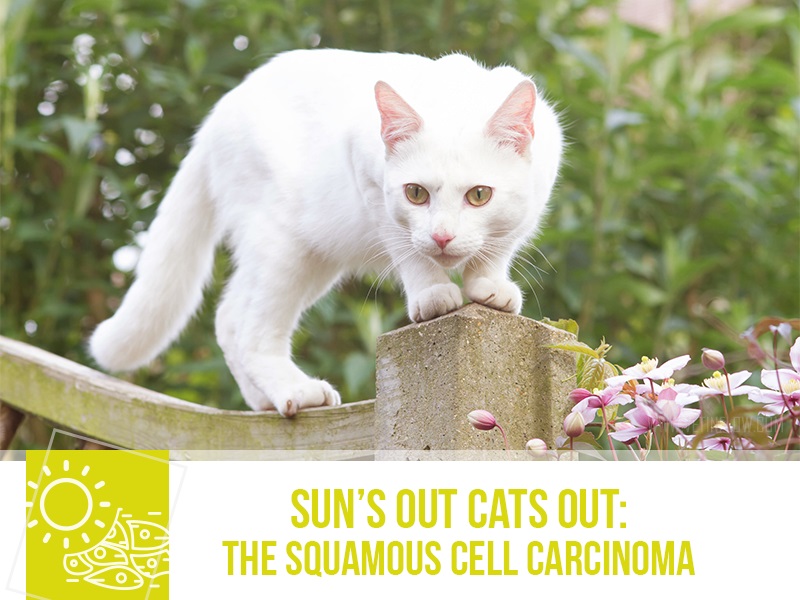
Sun's out Cats out: The Squamous Cell Carcinoma

Beautiful sunny days are right around the corner! And nobody loves that better than our purring partners who will undoubtedly lounge on the best sunny spots for hours on end.
But, as with everything, the sun can also have its ill effects. Like people, cats are susceptible to sunburns and some forms of cancer come from chronic exposure to the sun's ultraviolet light. Who is at the highest risk? Because fur protects from the sun's rays, white cats, especially short haired cats and obviously, cats with very little to no fur are at the most risk.
Squamous cell carcinoma is a form of cancer that arises from the squamous epithelium. This cell type forms most of the skin, lines the oral cavity and also the oesophagus. When these cells are hit with UV rays, they might get damaged at a DNA level and start having errors when they multiply this situation may lead to an uncontrolled proliferation of cells.
Most cases of this carcinoma are caused by chronic exposure to the sun, especially in areas with low fur density like the nose, ears and eyelids. Carcinomas that do not originate due to damages by UV radiation can happen anywhere, including inside the oral cavity and oesophagus. It's a disease of older animals, showing up usually at around age 10 or 12.
This type of cancer is locally invasive and can do severe damage to facial and head structures if left untreated though it has very little chances of migrating to other areas of the body that are far away from the original site. It often starts as small scabs that do not seem to heal that will progress into larger lesions with ulcers and rearrangement of bone and other structures.
How the disease progresses can vary a lot and treatment will depend on the cancer stage, location and cause. Animals with smaller lesions that can be submitted to surgery tend to have the best outcomes.
A couple of things that can help avoid this nasty situation are:
- High risk cats should avoid at high sunlight hours;
- UV light blocks for the windows in cats that love to sunbathe;
- Sun block, especially on ears. Make sure you keep an eye on your cat, so they don't clean it off before it gets absorbed!
If you notice odd wounds on your cat, especially that seem to be getting worse or that don't seem to heal at all, don't hesitate to contact your vet!
The sooner this is treated, the better the chances your fuzzy friend has.
Image via: "White Beauty Visiting" by Pinti 1, was built upon and is licensed under CC BY 2.0
Would you like to know more about cats? Check our Feline Courses:
Feline courses
Published: 05 May 2017
Read the previous article: The Pituitary and You: Cushing's Disease in Horses

